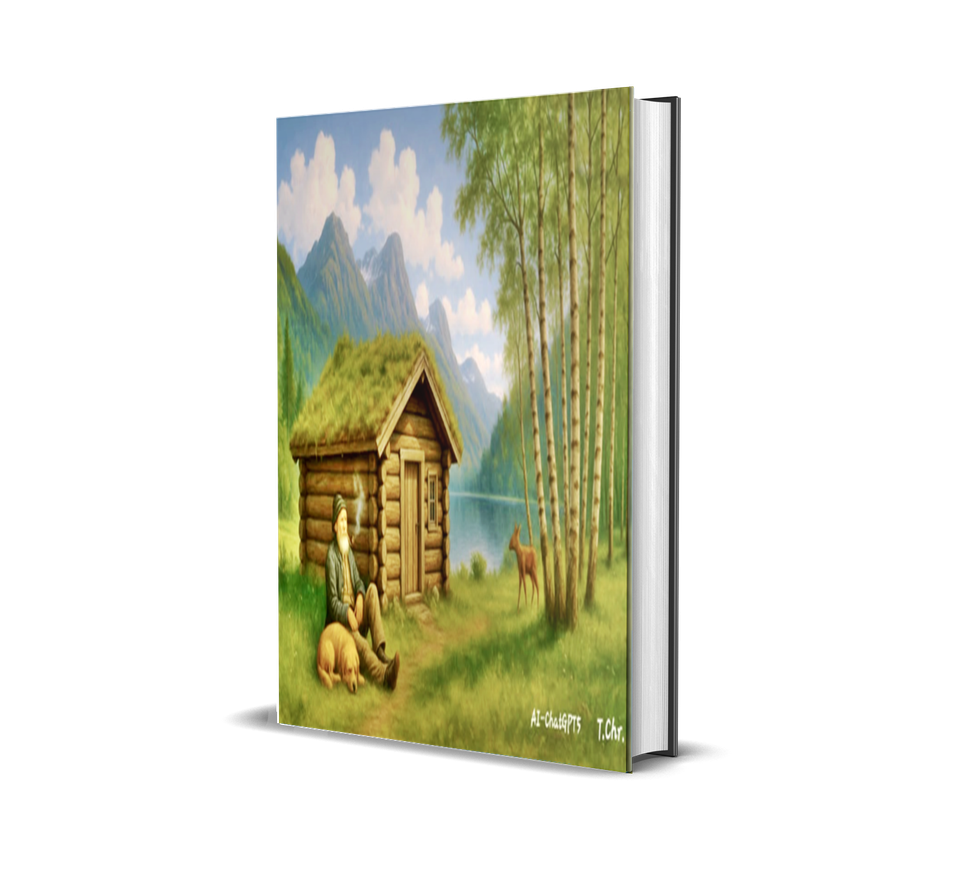THE CABIN AMONGST THE BIRCH TREES

By AI-ChatGPT-.T.Chr.-Human Synthesis-12 August 2025
Tore didn’t live in the cabin—at least, not most of the time. His real home was a snug white house in a coastal Norwegian town, where the cries of gulls and the scent of saltwater were part of daily life. But whenever the weather looked promising, he would load up his old Volvo, whistle for Bonnie, and head inland toward the mountains.
Six hours of winding roads brought them to a gravel lay-by at the edge of the woods. There, he would cut the engine, breathe in the pine air, and watch Bonnie leap out as if they had arrived at paradise itself. The cabin was still a good twenty-minute walk through the forest—a path that wound between birch trees, over roots, and past a small stream where Bonnie always stopped for a drink.
It was a walk Tore never rushed. He liked the sound of the leaves shifting overhead, the scent of moss, the way sunlight fell in golden spots on the path. Sometimes they would see an elk calf in the distance, half-hidden behind the birch trunks, its ears flicking nervously. Bonnie, well-trained, would only watch, tail wagging softly.
When the cabin finally came into view—squat and solid with its grass-covered roof—it always felt like stepping into another life. The lake beyond was still and blue, reflecting the high peaks that framed the horizon. Tore would unlock the door, open the small window to let in fresh air, and then settle himself against the cabin wall, pipe in hand, watching Bonnie sprawl in the grass.
The days at the cabin were for walking, fishing, and doing nothing in particular. They would hike into the low hills, sit by the lake, and sometimes follow deer trails deeper into the woods. Tore carried his coffee in a battered thermos, pouring it slowly while Bonnie sniffed the breeze.
By evening, they would be back at the cabin, the lake turning silver under the lowering sun. Tore would light the stove, cook whatever he had brought along—or the trout they’d caught—and then sit outside until the first stars came out.
A few days later, when it was time to head back to the coast, he would check the roof and lock the door. The walk back to the car always felt shorter, though part of him wanted to slow down, to stretch out the time.
He knew they’d be back before long. The cabin, the lake, and the birch trees would wait for them—just as they always had.
ALSO IN THE WINTER
"Snow on the Roof"
The coast in winter could be grey and raw, the wind bending trees along the harbourfront. But Tore never minded the cold. In fact, when the first real snowfall came to the mountains, he felt the pull toward the cabin even stronger.
One February morning, with frost still crisp on the Volvo’s windshield, he packed a bag, a sack of firewood, and a few days’ food. Bonnie hopped into the passenger seat as if she’d been expecting the trip all along. Six hours of driving took them from sea salt to pine resin, the roads narrowing as snowdrifts deepened on the verges.
At the forest lay-by, Tore killed the engine. The silence was absolute—no wind, no running water, only the muffled hush of snow on every branch. The path to the cabin was buried, but he knew it by heart: down past the old stone marker, over the frozen stream, and through the birch grove where the snow hung like lace. Bonnie bounded ahead, leaving a trail of pawprints for him to follow.
It was slow going. Snow clung to Tore’s wool trousers, and the air was sharp enough to sting his nose. Now and then they would flush a ptarmigan from its hiding place, or see a hare dash between drifts. The lake appeared at last, a flat white sheet, the mountains behind it softened by haze.
The cabin looked smaller under its heavy roof of snow, the chimney capped like a sugar-dusted cake. Tore brushed the steps clear, unlocked the door, and let the still, cold air roll out. Inside, it was just as he’d left it, save for the frost feathering the windowpanes.
The first fire was always the sweetest—crackling into life while Bonnie curled on the rug, steam rising from her fur. Outside, the world stayed quiet, the lake frozen solid, the sky fading to violet. Tore sat at the window with his coffee, pipe smoke curling into the lamplight, and watched snowflakes drift down into the dark.
For the next days, they wandered the white trails, their breath visible in the thin air. Sometimes they would hear the distant crack of ice shifting on the lake; other times, nothing at all. At night, the stars seemed closer, brighter, as if the cold had drawn them down.
When it was time to leave, Tore locked the door and took one last look at the roof, where a squirrel’s tracks zigzagged over the snow. The walk back to the car was easier downhill, but he still lingered.
Winter at the cabin had a hold on him—different from summer, quieter, yet somehow deeper. And he knew he’d feel its pull again when the next snow came.
